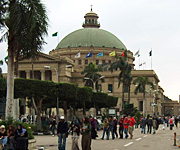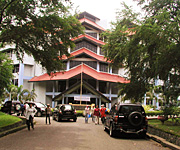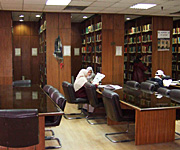Outline of the Program
1.Objective and Necessity for ITP

Interdisciplinary area studies at Kyoto University attempts to understand a geographical area through cooperation of human, social and natural sciences and by making a broad observation of the superstructure and substructure of the area. The basis of this is the language used in the field, and only when based on a sound understanding of the language is it possible to approach the totality of the culture of the area under study.
The primary objective of this program is to approach this totality through acquisition of the field language, something that is indispensable for area studies. At the same time, there are very few examples of universities carrying out above-mentioned interdisciplinary area studies in the world, and thus the second objective is to enhance the ability to communicate internationally the research achievements of this program.
It is probably not going too far to say that much of the language education in conventional graduate schools today is based either on the inadequate language acquisition theory that “you’ll learn the language when you get there, Eor classroom-taught language, which is often not appropriate for area studies based on field work. Thus, there is a need for a program such as this to break through this state of affairs and provide the kind of language education and training that is truly useful for area studies. In this program, young researchers will be dispatched to the research institute abroad that is most appropriate for their research field, and will be provided there with highly specialized language training. There are literally thousands of languages spoken in Africa and Asia, and courses in Japan only cover a handful of them. Most of them can therefore only be acquired by extensive training in the field under a program such as this.
2.This program places importance upon both academic language and vernacular language

In area studies, it is necessary to cultivate a holistic understanding through written materials on politics, economics, history, and theology, on the one hand, and oral materials on popular beliefs, ecology, and agriculture, on the other. The former aspects rely on an academic language, which is understood as a common language across a wide area, and research into these aspects is generally carried out through a study of academic literature. In contrast, the latter aspects, which become known through their rituals and objects, rely on vernacular language (the spoken language of the locality) as the medium of research. These languages often do not have writing systems, and so the research is carried out as field work, gathering data through the spoken word. Even when carrying out research into objects themselves, for example, the work would naturally be based on knowing what those objects are called in the local language.
Importance is thus placed on both academic language and vernacular language in this program. Academic language can be translated as the written words of intellectuals and vernacular language can be understood as the spoken words of ordinary people, and both are important to understand local culture in a holistic way from its most sophisticated to its baser levels. The language training that makes this possible is known in this program as “practical language education. E/p>
3.An educational system that guides from the input level to the output level

Whether based on field work or a scrutiny of academic literature, research must begin with information input. In this program, in order especially to expedite information input to the youngest researchers in the equivalent of the master’s program to the greatest possible extent, dispatching them to the foreign partner institutions for the acquisition of practical languages for area studies is one pillar of the program. Depending on the studied discipline, going to the field is sometimes left until after intensive study of the principles involved, and in that case educational assistance for the input level is extended to researchers in the PhD program.
Further, for PhD and post doctoral students, and assistant professors, even though the information input capability may be quite well developed, there is still a necessity to strengthen the output capabilities so that the person involved can communicate information to the international community. In this program, not only English, but also French and Arabic are the objects of the output level. In the case of West African studies and former French Indochina studies, it is French that is more important as an output language than English. Further, Arabic is the common academic language of the Islamic world and is becoming ever more important as a common language in international conferences. Through cooperation with the Center for Islamic Area Studies, established in the Graduate School of Asian and African Area Studies from 2007, we are carrying out Arabic language education in an endeavor to strengthen the ability to communicate with the international community in Arabic.
Further, the courses “On-Site Practical Language Seminar I Eand “On-Site Practical Language Seminar II Eare offered and students who take the training courses based on this program will receive credit. (From 2008 academic year)
4.Unique and Special Features of this Program
The unique and special features of this program are training carried out in the field and the importance placed on French and Arabic as languages of international communication in addition to English.


